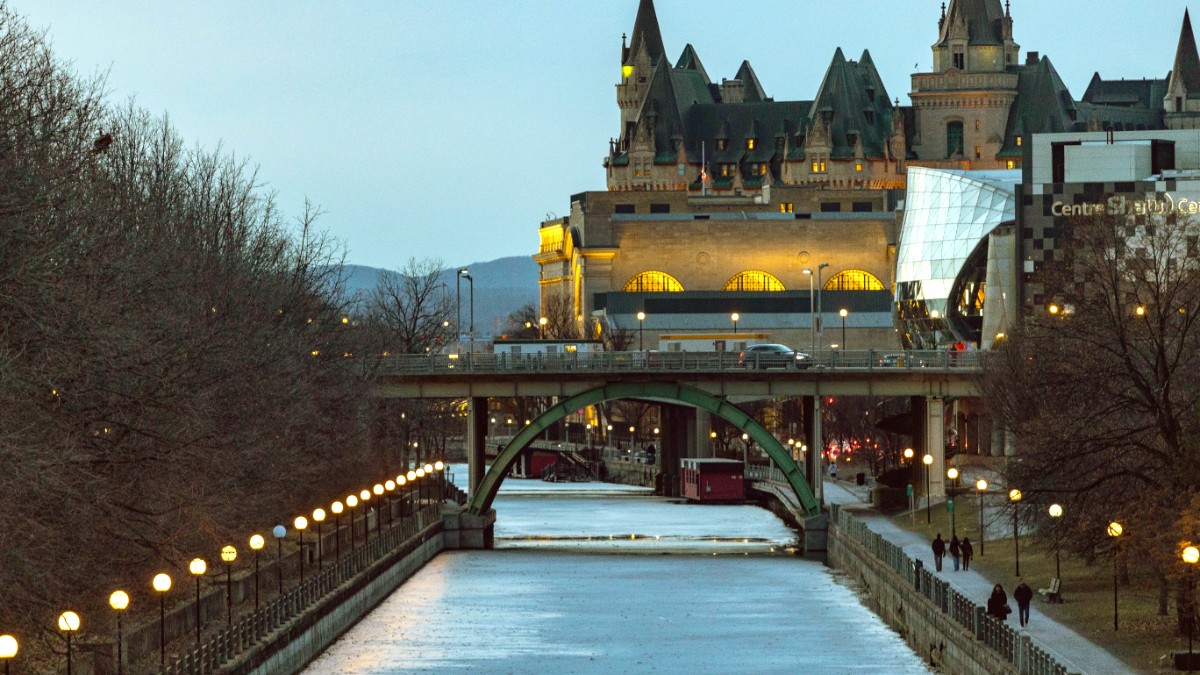
Ontario, Canada
Ottawa sits at the confluence of three significant rivers: the Ottawa River, which forms the border between Ontario and Quebec, and the Rideau and Gatineau Rivers. This strategic location has shaped its development and character. Positioned in the province of Ontario, the city lies just across the river from Gatineau, Quebec, creating a distinctive bilingual and cross-provincial metropolitan area. This geographical duality means visitors experience both English-speaking Ontario culture and French-Canadian influences within moments.
The city’s terrain features gentle hills, expansive green spaces, and a network of waterways. The Rideau Canal, an UNESCO World Heritage Site, winds through the city center, connecting a chain of lakes and rivers all the way to Kingston on Lake Ontario.
This canal is a recreational spine, inviting boating in summer and ice skating in winter. Beyond the urban core, rolling landscapes and a short drive lead to Gatineau Park, a vast conservation area offering an escape into nature with its forests, lakes, and trails. This blend of urban core and accessible wilderness makes Ottawa a destination for those who appreciate both city exploration and outdoor pursuits.
Ottawa's history traces back to a small logging community known as Bytown, named after Colonel John By, who oversaw the construction of the Rideau Canal in the early 19th century. This ambitious engineering feat connected the Ottawa River with Lake Ontario, creating a secure water route during the War of 1812. The canal's completion spurred Bytown’s growth, attracting settlers and commerce.
In 1857, Queen Victoria chose Bytown as the capital of the Province of Canada, a decision that surprised many due to its relatively remote location compared to larger cities like Montreal or Toronto. The choice was strategic: Ottawa was a compromise between the English and French-speaking populations, located far enough from the American border for security, and situated on the border of Upper and Lower Canada, symbolizing unity. This choice transformed the rough-and-tumble logging town into a national capital, leading to the construction of the iconic Parliament Buildings.
ByWard Market established.
Queen Victoria names Bytown capital.
Rideau Canal construction begins.
Growth of national institutions.
Evolution from frontier to modern capital.
Over the decades, Ottawa grew into a sophisticated capital city, while still retaining elements of its past. The ByWard Market, established in 1826, continues to operate as one of Canada's oldest and largest public markets, a direct link to the city's early commercial life.
National museums, archives, and government institutions have since been established, forming the core of the city’s identity and its role as a center for national memory and governance.
The city has hosted world leaders, marked moments of national pride and sorrow, and served as the stage for the country's ongoing story. Its evolution from a frontier settlement to a modern capital reflects Canada's own journey.
Ottawa's transformation from a logging town to a capital showcases a blend of rich history and ongoing development, a symbol of Canada's diverse heritage and progress.
Ottawa today presents visitors a welcoming atmosphere, combining the formality of a capital city with the warmth of a community. It is a city of distinct neighborhoods, each with its own character.
Downtown, around Parliament Hill, presents grand architecture and national monuments. The ByWard Market buzzes with activity, presenting a mix of restaurants, shops, and market stalls. The city's green spaces offer calm escapes, while its waterways invite recreation.
Home to national museums like the National Gallery of Canada and Canadian Museum of History.
Miles of pathways, Rideau Canal Skateway, Gatineau Park.
Diverse dining scene, poutine, BeaverTails.
Public transportation is reliable and simplifies movement around the city, connecting major attractions and neighborhoods.
Iconic government buildings, ceremonies, and historical significance.
Historic public market, dining, and unique shops.
UNESCO World Heritage Site for boating, skating, and scenic paths.
Multicultural culinary options from fine dining to casual eateries.
Sample local favorites like poutine and BeaverTails.
Discover fresh produce and artisan goods at ByWard Market.
Ottawa welcomes visitors with its blend of national significance, cultural vibrancy, and natural beauty.
It presents experiences that are both educational and deeply enjoyable.